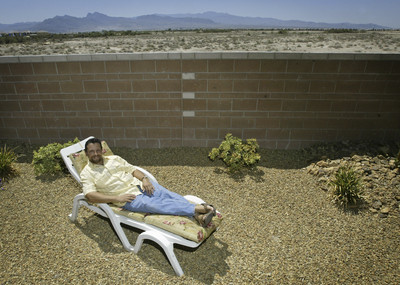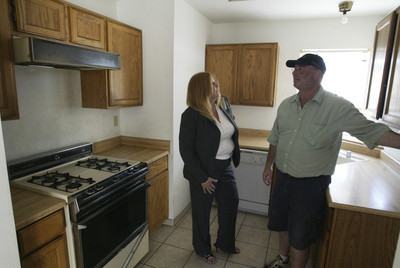Speculators come back


As a poker dealer at The Orleans, John Hill talks to players almost every day who have come to Las Vegas from faraway states and foreign countries.
They’re not all here for the card game. That’s just something to pass time when they’re not out scouring Las Vegas for a good investment home.
Median home prices have dropped 25 percent from last year to about $210,000, Las Vegas-based Home Builders Research reported. Foreclosures and short sales, or homes sold for less than the mortgage owed, account for roughly 65 percent of monthly sales.
What really boils Hill’s blood is that international and out-of-state buyers are snapping up housing deals while the backbone of Las Vegas’ tourism industry — people who earn most of their income from tips — are being squeezed out of the market.
“All the tip people can’t afford a home in Las Vegas because of the mortgage crisis, while people from China and the Philippines and Canada come in and buy homes like crazy,” Hill said.
Speculators and investors were partly blamed for the run-up in Las Vegas home prices from 2004 to 2006 and the ensuing foreclosure mess. It seems they’re back in town, circling like vultures.
“I think the investor mentality is surfacing again,” housing analyst Larry Murphy of Las Vegas-based SalesTraq said. “Some speculators, investors, buyers — whatever you want to call them — they got … caught in the wringer. This could be a more sophisticated investor.
“At least they survived. They’re not broke,” he added. “I’ve got to believe they’re buying with cash or I understand the banks will provide financing with a decent down payment.”
Many of them are cash buyers, Realtor Robin Camacho of Top10Real EstateValues.com said. She had a client from Canada who wanted to buy multiple homes in Las Vegas when the U.S. dollar had weakened against foreign currencies.
“I’m working with so many buyers, it’s unbelievable,” Camacho said. “It’s been tough getting offers accepted lately, even offers for well over list price. Right now, I’m working with at least seven or eight serious, well-qualified buyers — some strictly cash — at the same time, which is incredible, even in a good market.”
A report from Credit Suisse on the Las Vegas housing market said buyers are back and looking for deals. Traffic levels improved during the summer, especially on lower-priced homes.
Real estate agents noted a growing sense of urgency among buyers to “buy while the price is low” as inventory levels have been steady for several months and sales are starting to improve, the report said.
Mark Feinberg, a truck driver from New Jersey, wants to use equity from properties he owns on the East Coast to possibly buy two lower-priced homes in Las Vegas, where he plans to retire someday.
Feinberg made several offers on foreclosure homes during a visit in August, including a $73,500 bid on a fixer-upper in east Las Vegas that was listed for $64,900. He didn’t get it.
However, his $54,000 offer for a townhome in the same area was accepted.
“I probably like it least as far as possibly living there someday, but I like it most for the cash flow,” he said.
Feinberg said he prefers to invest in Las Vegas over other depressed places like New Jersey and Florida because he believes this market will rebound sooner.
“It’s the greatest place in the world and with real estate prices right now, it’s probably the best deal you’re going to find,” he said.
International buyers have been an important source of business since the market downturn, said Wayne Lee, marketing manager for foreign currency exchange specialist HiFX. It’s estimated that between 150,000 and 190,000 homes were sold to foreign nationals from May 2007 to May 2008.
Canada replaced Mexico as the country with the largest share of buyers in the United States, more than doubling from 11 percent last year to 23.5 percent this year. However, the U.S. dollar continues to strengthen against the Canadian dollar, making it more expensive for Canadians looking to buy U.S. properties, Lee said.
With the British pound remaining strong against the U.S. dollar and house prices softening, “many British buyers agree that now could be the perfect time to snap up a bargain in the States,” Justin Figgins, director of Rightmore Overseas, said in the National Association of Home Builders’ online newspaper.
The British pound rose against the dollar Friday, going to $1.8355 from $1.8192.
During this year’s first half, searches by buyers in the United Kingdom for real estate in the United States rose by 50 percent to 190,000 a month on average, Figgins said.
Most of the loans that Patrick McNaught sees as president of Greystone Financial Group in Las Vegas are primary residents who’ve been “sitting on the sidelines,” priced out of the housing market and renting in the meantime. They’re buying with Federal Housing Administration financing and 3 percent down, he said.
Investors of properties financed through Freddie Mac and Fannie Mae are required to come up with substantially more, anywhere from 10 percent to 25 percent down, he said.
“So FHA gives working borrowers in town the opportunity to enter the marketplace,” McNaught said.
Local resident Wendy Reese was able to snag a foreclosure home in northwest Las Vegas. It was listed for $299,000 and had three offers before the “For Sale” sign was put up. She got the five-bedroom, 3,100-square-foot home for $303,000.
The 4-year-old house needed cleaning and was missing window coverings, light fixtures and ceiling fans, but Reese said she liked the countertops and floor plan.
“I could look past the dirt and visualize it,” she said. “I had been doing my research and every time I found a home and ran to it, it was like, ‘We have 12 offers.’ Some were cash deals. It’s definitely a buyer’s market.”
The window of opportunity is shrinking, Joe Stewart of Realty Executives said. Recent housing reform legislation passed by Congress does away with seller-assisted down payment programs, which will make it tougher for local residents to buy a home. Also, FHA is increasing down payments from 3 percent to 3.5 percent effective Oct. 1.
“It is going to materially affect people in this town who truly deserve to have a home, who are well qualified but don’t have that much cash saved up,” Stewart said. “It’s a big issue and one that the shadow Congress has to work with.”
Resale homes on the Multiple Listing Services continue to be distributed toward units not occupied by the owner. Vacant properties accounted for 54.1 percent of inventory, while tenant-occupied properties made up 9.9 percent, Las Vegas-based research firm Applied Analysis reported.
The remaining owner-occupied units represented a more modest 36 percent of all listings.
The 23.2 percent year-over-year decline in resale inventories is primarily due to a reduction in owner-occupied listings, suggesting investors and speculators continue to be impacted, Applied Analysis principal Brian Gordon said.
Both investors and primary homeowners are benefiting from huge downward adjustments in Las Vegas home prices, Lindsay Watt of Gavish Real Estate said.
“Although the housing market bubble has blown overvalued houses back to realistic prices, it’s created a tremendous opportunity for people in this town to own a home based on a real-life wage,” Watt said. “With Las Vegas being a service-based town, it was completely unrealistic that these values would maintain.”
Contact reporter Hubble Smith at hsmith@reviewjournal.com or 702-383-0491.












